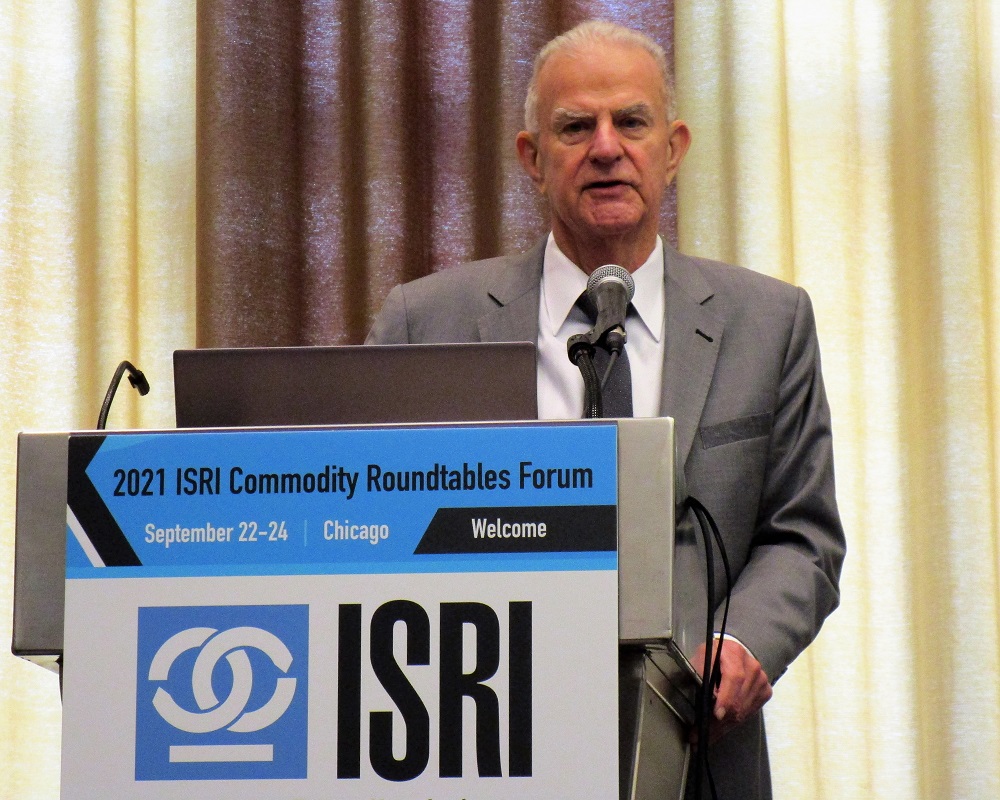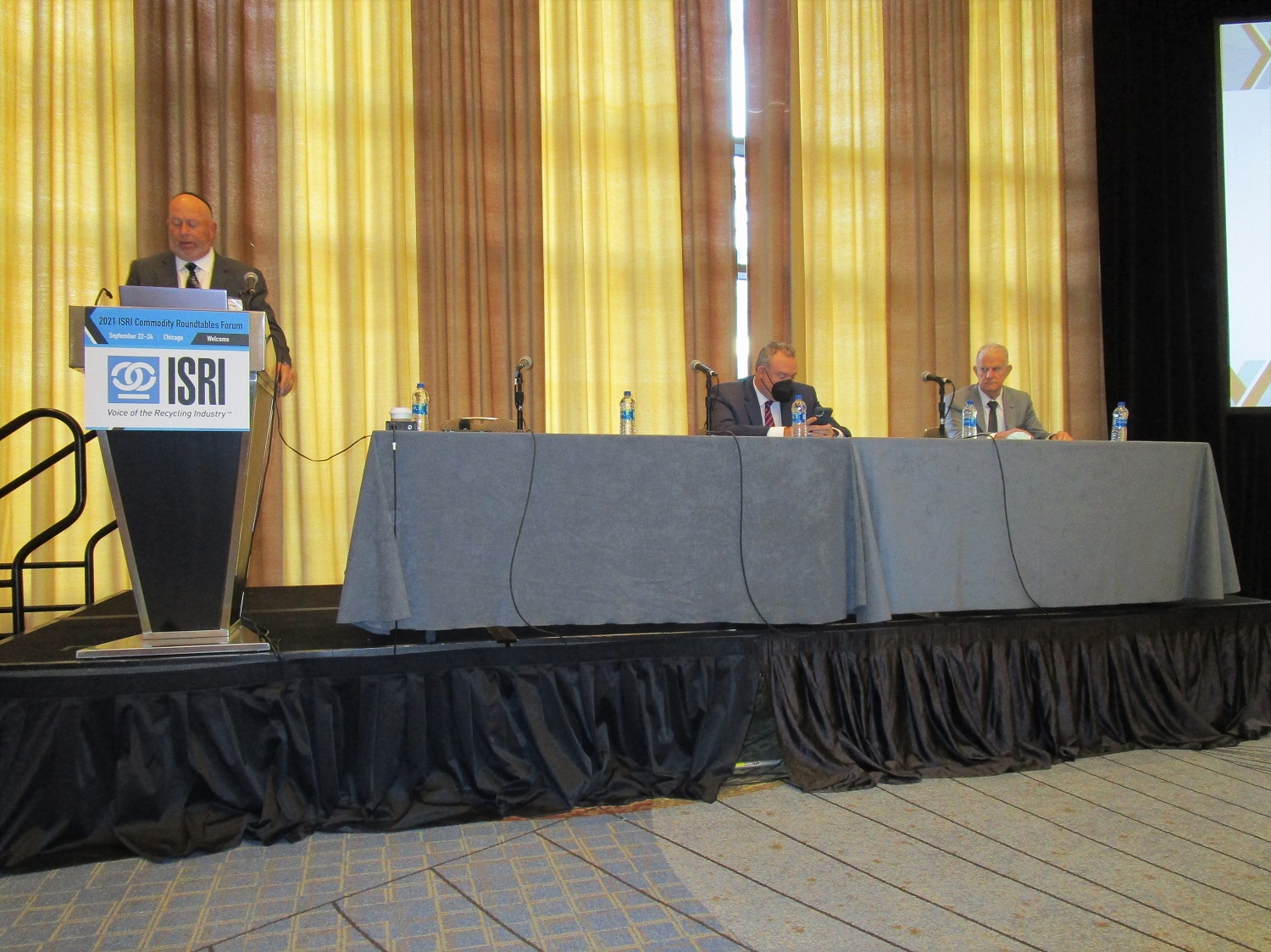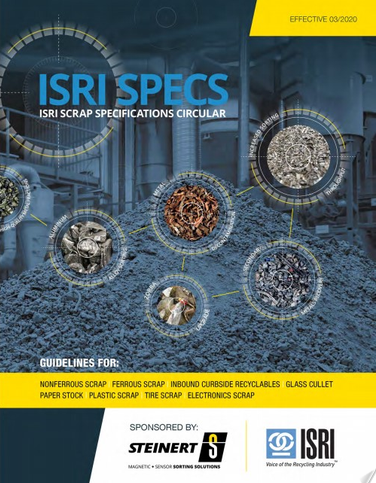ISRI’s 2021 Commodity Roundtables Forum is over, but its effects linger. “The value is grabbing the information all of our speakers give,” explains Marvin Finkelstein, 2nd vice chair of ISRI’s Nonferrous Division, who chaired the Sept. 24 Aluminum Roundtable. “Government and company policies will be discussed here and can be taken home [by members]. We’re always planning for the next [business] year.”
This year’s event in Chicago attracted more than 675 attendees and 20 company sponsors. Attendees could interact with a variety of companies at 17 table-tops outside the lecture hall, as well in face-to-face meetings elsewhere in the Hyatt Regency Chicago. “ISRI’s first live networking and education event attracted a stronger-than-expected registration,” states Chuck Carr, ISRI’s vice president of convention and meetings. “We got great positive feedback from our members that will help us plan for next year,” The Commodity Roundtables Forum will return September 13-15, 2022, to the Hyatt Regency Chicago.
Aluminum Roundtable
Speaker Jay Armstrong, president of TriALco Inc., discussed the revolution in automotive supply that electric vehicles (EVs) are causing. More and more manufacturers like Honda and Volkswagen are rapidly shifting production from internal combustion-powered vehicles to e-cars and e-trucks. Instead of 200 suppliers to produce a BMW M3 TwinPower Turbo inline six-cylinder engine with 1,200 parts, a typical EV from General Motors will have a motor with only six parts: an armature or rotor, a commutator, brushes, an axle, a field magnet, and a DC power supply.
“I think you’re going to lose 170 pounds [of aluminum] per car—that is in the engine and transmission,” Armstrong predicts. “If 25 percent of the existing car market—4 million vehicles—shifts to the EV, we’re going to see a loss of 680 million pounds annually.” He urges recyclers and others to adapt to change, using automation, and to seek out opportunities for repurposing new materials in future EVs .

Panelist Jason Schenker, president of Prestige Economics LLC, reprised many of his points from the Sept. 23 general session on financial risks and asset management. He noted that Baby Boomers are poised to retire en masse with fewer younger workers to replace them—and to pay taxes to support the U.S. $28 trillion national debt. He also questioned the Federal Reserve’s recent signaling that interest rates will only slightly rise next year, offset by the Fed’s predicted tumble in durable goods costs.
Schenker notes that remote work is a factor for managing the workforce post-COVID-19. Recruiters from tech companies are offering, “California wages in San Antonio—and you don’t have to move to California.” This may not affect manual work like torch cutting, but it could affect ISRI members in their offices: human resources, accounting, sales, and other service-oriented jobs. “The money from higher-cost markets is coming for your labor force,” he cautions.
In-person Events
“Whether processors, brokers, traders, or others, attendees praised ISRI for offering an opportunity to collect information and do business in a relaxed atmosphere. Commodity Roundtables were great this year,” ISRI Chair Gary Champlin remarks. “It’s the first year I’ve ever attended; I think it’s something I’ll attend in the future. I was very impressed with the amount of people who showed up, and the quality of the speakers was excellent.”
ISRI’s next in-person national event will be the 2021 Fall Committee & Board of Directors Meetings, taking place Oct. 18-20, at the Charleston Marriott in Charleston, S.C. The meetings also will be available to registrants through video link. The Southeast Region Fall Conference and Trade Show is Oct. 19-23 in Charleston.
Photos courtesy of ISRI.
Additional Resources












